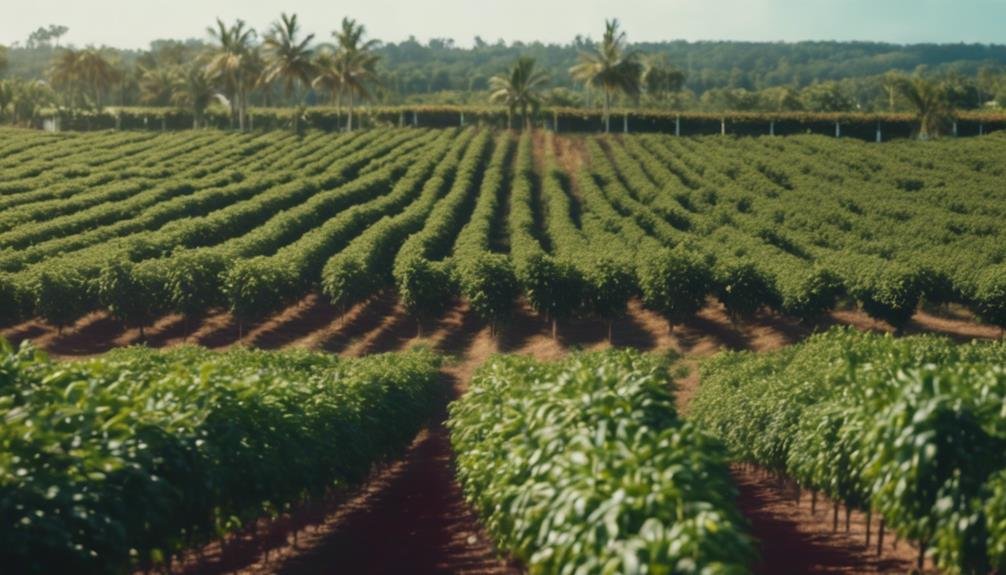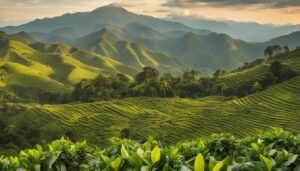Florida's coffee revolution is gaining momentum, with growing conditions surprisingly suitable for certain varieties. The state's climate, characterized by warm temperatures and high humidity, aligns well with coffee plant requirements. Home cultivators can succeed by focusing on proper soil composition, regular pruning, and consistent watering. Commercial prospects are being explored, with the University of Florida conducting research on feasibility and sustainable practices. Advanced monitoring techniques are employed to evaluate soil conditions and climate adaptability. The potential economic impact is promising, with locally grown coffee potentially creating new revenue streams for farmers. As research progresses, Florida's role in the global coffee market may expand significantly.
Florida's Coffee Growing Climate
Florida's unique climate provides a surprisingly suitable environment for growing coffee plants, despite not being traditionally associated with coffee production. The state's temperature ranges align well with coffee's climate requirements, typically falling between 60-80 degrees Fahrenheit, which is ideal for coffee cultivation. However, growers must be cautious of occasional cold snaps, as coffee plants should not be exposed to temperatures below 45 degrees.
Soil composition and humidity levels also play pivotal roles in successful coffee cultivation. Florida's diverse soil types can be adapted to meet coffee's needs, often requiring amendments to achieve the right balance of nutrients and drainage.
The state's naturally high humidity levels benefit coffee plants, which thrive in moist environments. While commercial production is not yet widespread, many Floridians successfully grow Arabica or Robusta coffee varieties at home, taking advantage of these favorable climatic conditions.
Home Cultivation Techniques
Building on Florida's favorable climate for coffee plants, enthusiasts across the state have developed effective techniques for cultivating coffee at home. Successful cultivation begins with proper soil composition, typically a well-draining mix of loam, sand, and organic matter.
Regular pruning is essential to maintain plant shape and encourage healthy growth. A consistent watering schedule is vital, with deep watering once or twice a week depending on rainfall and humidity levels.
Pest control is another important aspect of home coffee cultivation in Florida. Common pests include mealybugs and scale insects, which can be managed through natural predators or targeted insecticidal soaps. Growers should also be vigilant for signs of fungal diseases, which can be prevented by ensuring proper air circulation and avoiding overwatering.
Commercial Production Prospects

Despite the success of home cultivation, the potential for large-scale commercial coffee production in Florida remains a subject of ongoing research and debate. The University of Florida is spearheading studies to evaluate the feasibility of commercial coffee farming in the state. Researchers are employing advanced monitoring techniques and conducting tasting trials to gauge the quality and market potential of Florida-grown coffee.
Key aspects of the ongoing research include:
- Analyzing soil conditions and climate adaptability
- Developing sustainable farming practices
- Evaluating economic viability and market demand
- Exploring potential coffee varieties suited for Florida's climate
The focus on sustainability initiatives aligns with growing consumer preferences for environmentally responsible products. As the global coffee market continues to expand, Florida's entry could offer a unique opportunity for domestic production. However, success will depend on achieving both quality and economic viability to compete in the established global market.
Research and Development Efforts
Several research institutions and agricultural organizations are actively investigating the potential for commercial coffee production in Florida. Researchers are focusing on developing sustainable practices that can support large-scale cultivation while ensuring the coffee's global appeal.
The University of Florida is at the forefront of these efforts, employing advanced monitoring techniques to track plant growth and development.
A vital aspect of this research involves taste tests and roasting techniques. Scientists are carefully evaluating different roasting methods to determine which processes yield the most desirable flavors from Florida-grown coffee beans.
These taste tests are essential for evaluating the quality and marketability of the state's coffee production.
Economic Impact and Future Outlook

The potential economic impact of commercial coffee production in Florida has sparked considerable interest among agricultural economists and industry experts. Market analysis suggests that locally grown coffee could create new revenue streams for farmers and boost the state's agricultural sector. Industry trends indicate a growing demand for specialty and sustainably sourced coffee, positioning Florida as a potential player in the global market.
To visualize the future of Florida's coffee industry, consider the following:
- Rows of coffee plants thriving in Florida's warm climate
- State-of-the-art processing facilities ensuring quality production
- Local roasteries showcasing Florida-grown coffee to enthusiasts
- Farmers markets featuring freshly harvested coffee beans
Sustainability practices will be essential for long-term success, addressing environmental concerns and meeting consumer expectations. As research progresses, the global impact of Florida's coffee revolution remains to be seen, but the potential for economic growth and diversification is promising.
Conclusion
Florida's budding coffee industry holds significant promise for both home growers and potential commercial producers. The state's climate, coupled with ongoing research and development efforts, creates a conducive environment for coffee cultivation.
As an example, the University of Florida's taste tests and monitoring techniques are advancing the potential for large-scale production. While challenges remain, the development of a Florida coffee industry could diversify the state's agricultural sector and offer unique, locally-grown options to consumers.
The coming years will be pivotal in determining the viability of this emerging market.












